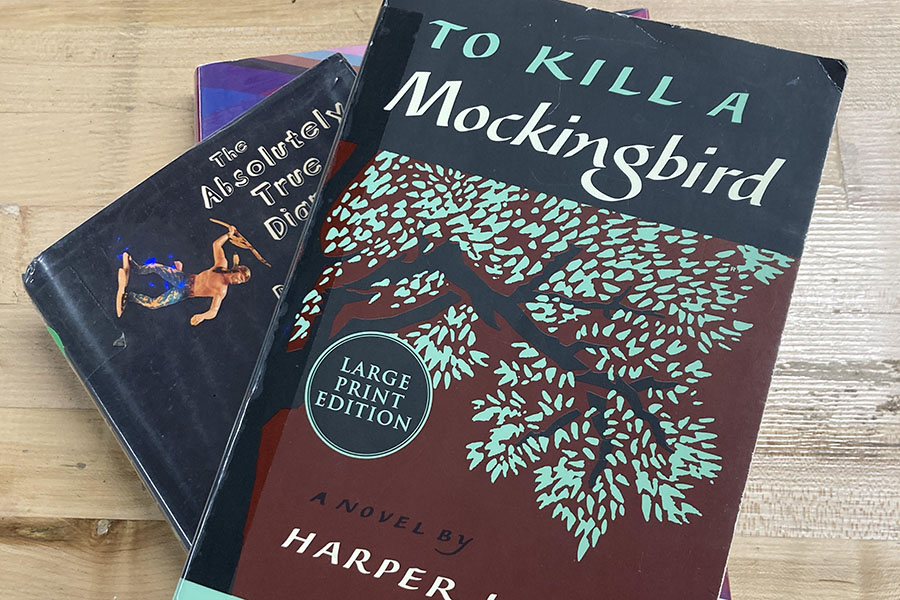In April of 2022, Governor Glenn Youngkin signed Senate Bill 656 into law, requiring parents to be notified of all instructional material that contains “sexually explicit content” before it is taught in classrooms. Now, in the first full school year with the legislation, teachers and students alike at Western have begun to truly feel the effects of this bill.
This law comes in the midst of a growing national focus on classroom content with states such as Texas and Iowa passing similar legislation—legislation which, according to the Virginia ACLU will “most likely result in censorship.”
In the US between January and September of 2023, nearly 4,000 titles were challenged, meaning a request was filed for them to be banned. Following Texas, Virginia has the second highest number of challenges with 356 books reported, according to the American Library Association (ALA).
In the microcosm of the WAHS library, staff have worked overtime to appropriately mark books as “INR”— instructional notification required— thoroughly checking the content of both the books taught in the classroom and those that live on library shelves for student enjoyment. So far, 32 books have been marked at Western.
Lori Linville, one of the WAHS librarians, said, “[I would] feel happy to do it, if it is going to be valuable for our students and our families… but it feels a little more arbitrary.” She added that she has concerns about the sole focus on sexual content, rather than other potentially harmful topics for students, such as violence.
Beyond the labor-intensive content-checking aspect of the policy, the workload for teachers, especially English teachers, is complicated by new bureaucratic processes. Dottie Akers, for example, spent the beginning of her year sending out parental consent forms that require signatures from parents for students to read INR books.
Akers also worries that this policy will target books by marginalized authors more than those in the literary canon. “I think it’s part of a larger trend that we’re seeing nationwide, and I think it’s had really unfortunate effects on students’ education,” Akers said.
Akers’ sentiment is echoed by certain statistics. While this law— and many of those found in other states across the country— focuses on sexual content, PEN America reported that, of all banned books, 30% contained characters of color or themes of race or racism and 30% contained LGBTQ+ themes/characters, with some overlap, in the past year.
Of the specific titles banned, some of the most prominent include “Gender Queer: A Memoir” by Maia Kobabe; “All Boys Aren’t Blue” by George M. Johnson, a non-fiction book about growing up as a queer Black man; “The Hate U Give” by Angie Thomas; “The Absolutely True Diary of a Part-Time Indian” by Sherman Alexie; and multiple titles by Nobel laureate and Pulitzer Prize winner Toni Morrison including “Beloved” and “The Bluest Eye.”
In general however, WAHS is an outlier to the book-banning movement, as Linville has reported no formal requests to ban a book at Western. Nearby counties, though, have taken Governor Youngkin’s policy a step further and are now removing books from shelves.
In Spotsylvania, a Northern Virginia county, 14 books were removed from school libraries, with a 4-2 vote from school board members, based on the same definition of “sexually explicit content” that the new bill relies on.
Madison County has followed a similar path, though less definitively. In following Youngkin’s policy, they allow parents to submit complaints if they believe books contain sexually explicit content, which school board members will review, and, if deemed necessary, remove the book from school shelves.
Even within Albemarle County, students’ access to a specific title was challenged at Albemarle High School. After a single parent complaint in April of 2022, around the time when Younkin passed the bill, AHS principal Darah Bonham instructed the school librarian to remove Sarah J. Maas’ “A Court of Mist and Fury” from library shelves.
The parent, frustrated by sexually explicit content, called the book “pornographic” and suggested that Bonham “immediately remove it from ALL ACPS schools.” Though the book was removed from AHS shelves, librarians and students alike challenged the act.
Regarding this nearby censorship, Linville said that “it feels a little like there’s dark clouds on the horizon, like it’s looming.”
That said, “I am really pleased with some of the things that Albemarle County has done to follow this new law… to still honor all of our students,” she added. In particular, she cited the county’s continuance of their procedure of book adoption. They still use, for example, professional reviews to determine library materials; the only difference is that they now have to mark books as “INR.”
Principal Jenn Sublette added “We’re here to make sure that kids with all types of backgrounds and perspectives can see themselves in our work… and I’m happy to do anything that’s about partnering with families. That doesn’t scare me in our community.”




